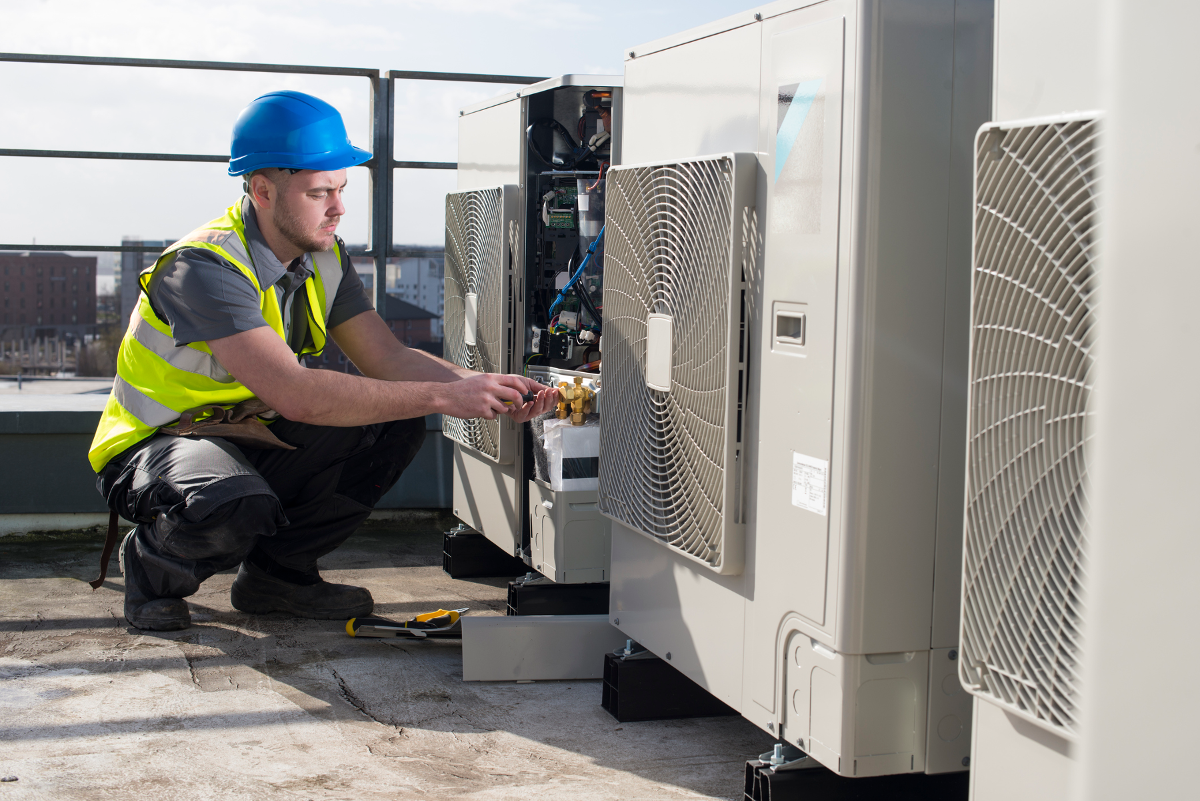Do you want to find a high-paying job in the field of commercial HVAC? Look no further! In this article, we will explore the exciting world of commercial HVAC jobs and the lucrative opportunities they present. Whether you are an experienced technician looking to advance your career or someone just starting out in the industry, there is a promising future for those skilled in commercial HVAC. From installing and maintaining heating and cooling systems in large-scale buildings to troubleshooting complex issues, these specialized jobs offer competitive salaries and room for growth. So, let’s uncover the possibilities and discover the path to a rewarding career in commercial HVAC!
1. Overview of Commercial HVAC Jobs
1.1 Importance of commercial HVAC
Commercial HVAC (Heating, Ventilation, and Air Conditioning) is a crucial aspect of any commercial building. It ensures a comfortable and productive environment for employees, tenants, and customers. Commercial HVAC systems are responsible for maintaining a consistent temperature, providing proper ventilation, and ensuring clean and healthy air quality. Without functional HVAC systems, businesses would face numerous issues such as decreased productivity, customer dissatisfaction, and potential health hazards. Thus, the importance of commercial HVAC cannot be overstated.
1.2 Growing demand for commercial HVAC professionals
In recent years, there has been a significant increase in the demand for commercial HVAC professionals. As businesses continue to expand and new commercial buildings are constructed, the need for skilled HVAC technicians and engineers is on the rise. With the increasing complexity of HVAC systems and the growing emphasis on energy efficiency and sustainability, there is a constant need for professionals who can install, repair, and maintain these systems effectively.
1.3 Advantages of pursuing a career in commercial HVAC
Choosing a career in commercial HVAC offers numerous advantages. Firstly, it provides job stability and security due to the high demand for skilled professionals in the industry. Additionally, commercial HVAC jobs often offer competitive salaries and benefits, making it a financially rewarding field. Moreover, working in HVAC allows you to work in various settings, from hospitals to office buildings, providing a diverse and interesting work environment. Lastly, the field of commercial HVAC offers opportunities for career growth and advancement, allowing you to continually expand your knowledge and skills.
2. Essential Skills and Qualifications
2.1 Technical expertise in HVAC systems
To excel in commercial HVAC jobs, a strong technical understanding of HVAC systems is essential. This includes knowledge of heating, ventilation, air conditioning, and refrigeration principles. Familiarity with different types of HVAC equipment, such as boilers, chillers, and rooftop units, is also crucial. A comprehensive understanding of HVAC controls and their programming is necessary to ensure optimal system performance.
2.2 Knowledge of commercial building codes and regulations
Commercial HVAC professionals must have a solid understanding of building codes and regulations specific to commercial buildings. This includes knowledge of safety protocols, environmental regulations, and energy efficiency standards. Compliance with these codes is vital to ensure the safety and well-being of occupants and to avoid legal complications.
2.3 Troubleshooting and problem-solving skills
Commercial HVAC systems can encounter various issues and malfunctions. Being able to diagnose problems and troubleshoot them efficiently is a crucial skill for HVAC professionals. From identifying faulty components to repairing complex electrical circuits, strong problem-solving abilities are a necessity in this field. The ability to think critically, analyze data, and make informed decisions is invaluable when dealing with intricate HVAC systems.
2.4 Strong communication and customer service abilities
Communication and customer service skills are essential in commercial HVAC jobs. HVAC professionals often interact directly with clients, building owners, and occupants, so they must be able to effectively communicate technical information in a clear and understandable manner. Building positive relationships with clients and providing exceptional customer service is crucial to ensure client satisfaction and maintain a good reputation.
2.5 Relevant certifications and licenses
To work in commercial HVAC, it is important to acquire relevant certifications and licenses. This includes obtaining certification from organizations such as the North American Technician Excellence (NATE) and the Refrigeration Service Engineers Society (RSES). Additionally, some states require HVAC professionals to hold specific licenses. These certifications and licenses validate your skills and knowledge, making you a more marketable candidate for high-paying commercial HVAC jobs.
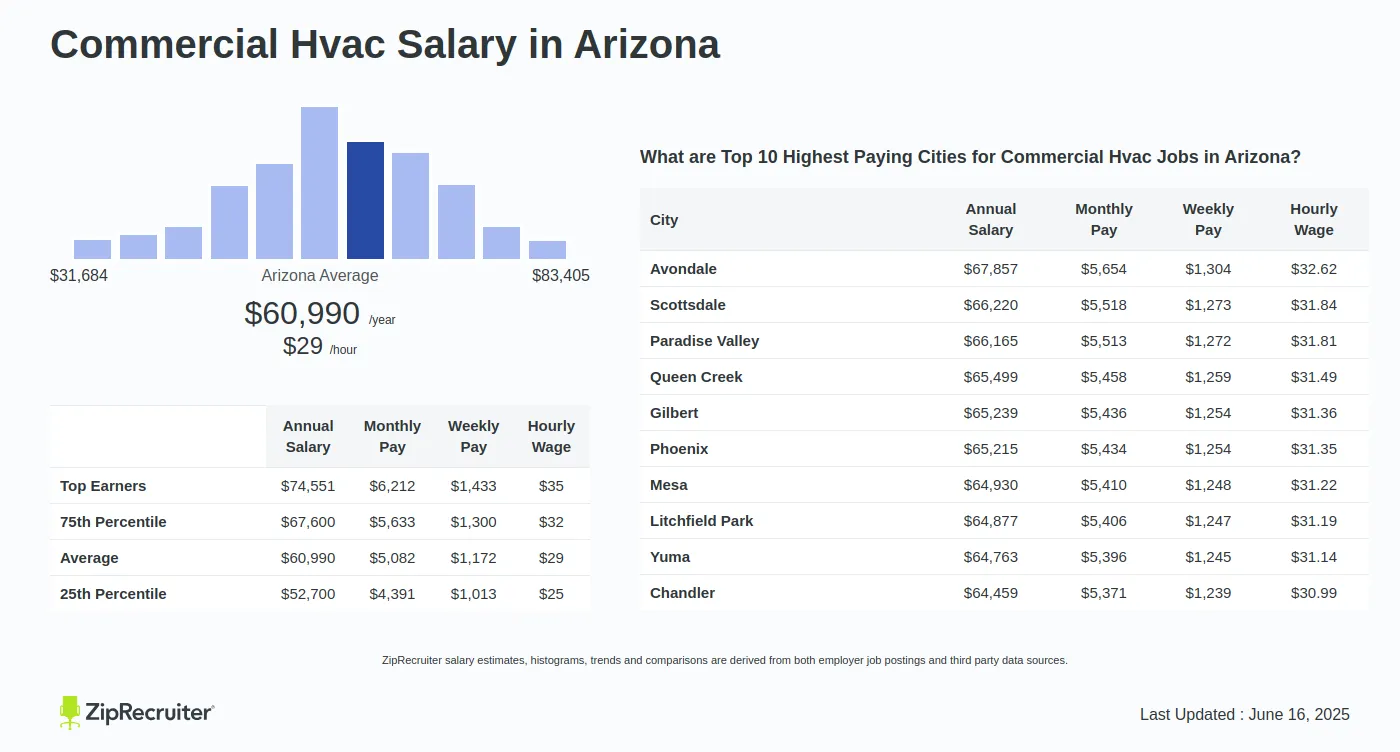
This image is property of www.ziprecruiter.com.
3. Types of High-Paying Commercial HVAC Jobs
3.1 Commercial HVAC Technician
A commercial HVAC technician is responsible for installing, maintaining, and repairing HVAC systems in commercial buildings. They diagnose equipment malfunctions, perform necessary repairs or replacements, and ensure that the HVAC systems are operating efficiently. Commercial HVAC technicians may specialize in specific types of equipment or focus on certain industries, such as healthcare or hospitality. With experience and expertise, technicians can earn competitive salaries in this field.
3.2 HVAC Installer
HVAC installers play a crucial role in the construction phase of commercial buildings. They are responsible for installing HVAC systems according to design plans and specifications. HVAC installers work closely with other construction professionals and oversee the integration of HVAC systems into the building structure. This role requires strong technical skills and attention to detail to ensure proper installation.
3.3 HVAC Supervisor
An HVAC supervisor oversees the work of HVAC technicians and installers. They provide guidance and support, ensuring that projects are completed on time and meet quality standards. HVAC supervisors are also responsible for managing schedules, coordinating with clients, and resolving any issues that may arise during the installation or maintenance process. With their leadership and management skills, HVAC supervisors can earn higher salaries within the field.
3.4 HVAC Project Manager
HVAC project managers are responsible for overseeing large-scale HVAC projects from start to finish. They plan and coordinate the installation or renovation of HVAC systems in commercial buildings, working closely with architects, engineers, and contractors. HVAC project managers ensure that projects are completed within budget, meet deadlines, and comply with all relevant regulations and codes. This high-level position requires strong organizational and leadership skills, as well as comprehensive knowledge of HVAC systems.
3.5 HVAC Sales Engineer
An HVAC sales engineer combines technical expertise with sales skills to promote and sell HVAC equipment and systems to commercial clients. They assess client needs, make product recommendations, and provide cost estimates. HVAC sales engineers also collaborate with architects and engineers to design HVAC systems that meet client specifications. This role requires a deep understanding of HVAC systems, as well as excellent communication and negotiation skills. Sales engineers can earn significant commissions and bonuses based on sales performance.
4. Salary Potential in Commercial HVAC
4.1 Factors influencing salary levels
Several factors can influence the salary levels in commercial HVAC jobs. Experience and expertise play a significant role in determining compensation. Highly skilled technicians and professionals who have specialized knowledge in specific areas often command higher salaries. Additionally, the location of the job can impact salary potential, with urban areas and regions with a high demand for HVAC services generally offering higher compensation.
4.2 Average salary ranges for different commercial HVAC positions
While salaries can vary depending on the factors mentioned, it is helpful to understand the average salary ranges for different commercial HVAC positions. Commercial HVAC technicians typically earn between ,000 and ,000 per year, depending on their level of experience and specialization. HVAC installers can expect to earn between $35,000 and $60,000 annually, while HVAC supervisors may earn between $50,000 and $80,000 per year. HVAC project managers can earn between $60,000 and $100,000 annually, and HVAC sales engineers have the potential to earn between $70,000 and $120,000 per year.
4.3 Opportunities for career advancement and salary growth
The field of commercial HVAC offers numerous opportunities for career advancement and salary growth. By gaining experience, expanding skills and knowledge, and obtaining advanced certifications, professionals can progress to higher-paying positions. Moving into supervisory or management roles, specializing in niche areas such as energy efficiency or building automation, or starting your own HVAC business are all avenues for career growth and increased earning potential.
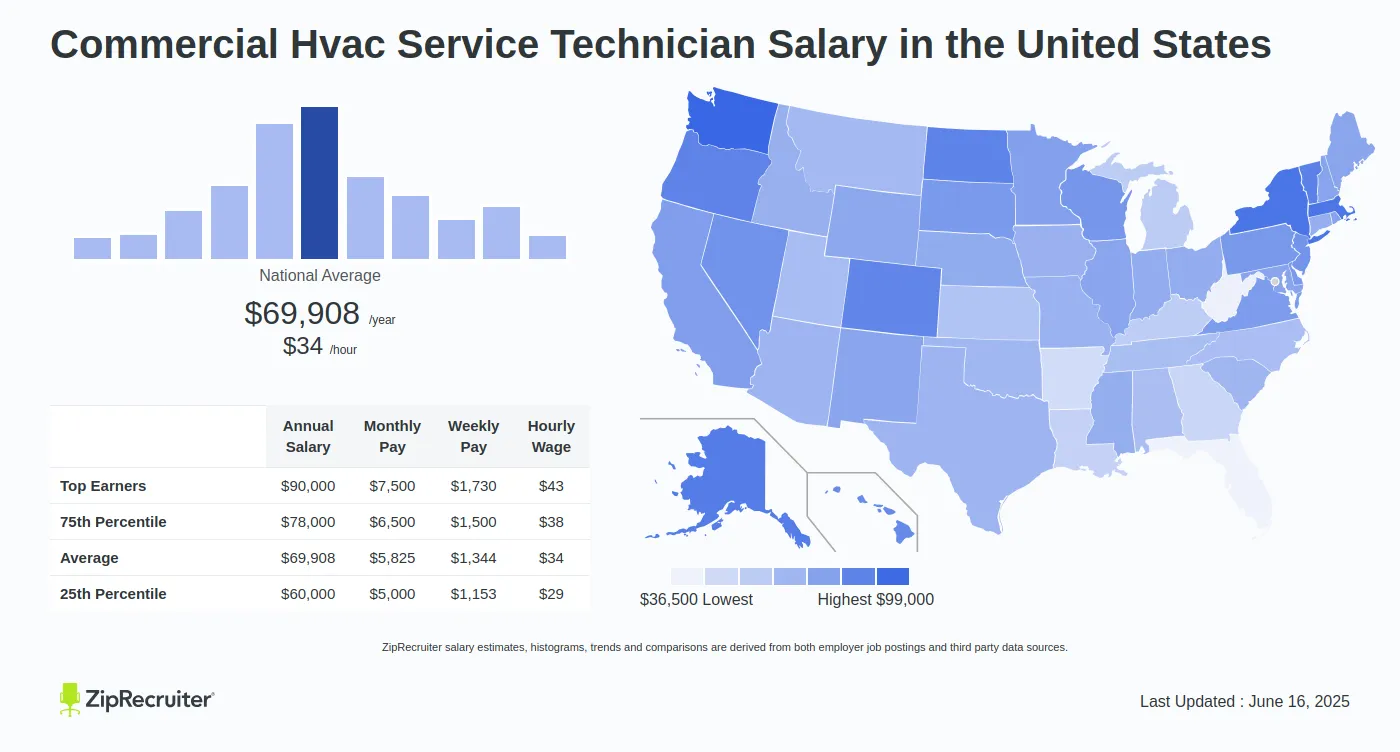
This image is property of www.ziprecruiter.com.
5. Job Market Outlook
5.1 Growing demand for commercial HVAC services
The job market for commercial HVAC professionals is expected to grow significantly in the coming years. As businesses continue to expand and construction of commercial buildings increases, the demand for skilled HVAC technicians, installers, and engineers will rise. Moreover, the increasing focus on energy efficiency and sustainability in commercial buildings will require professionals with expertise in these areas. The growing demand for commercial HVAC services ensures a positive job market outlook for those pursuing careers in this field.
5.2 Job prospects and stability in the industry
The stability of the commercial HVAC industry is another appealing aspect for professionals. As HVAC systems are essential to the functioning of commercial buildings, the need for HVAC services remains constant. This industry is less susceptible to economic downturns compared to other sectors. Job prospects in commercial HVAC remain strong, with a steady flow of projects and a continuous demand for maintenance and repairs.
5.3 Opportunities for specialization and niche markets
The commercial HVAC industry offers various opportunities for professionals to specialize in niche markets. As buildings become smarter and more technologically advanced, there is a growing need for HVAC experts in areas such as building automation, energy management, and sustainable design. By focusing on these specialized areas, HVAC professionals can differentiate themselves and enhance their earning potential.
6. Training and Education
6.1 Vocational and trade schools
Vocational and trade schools offer programs specifically designed to provide the necessary training for careers in commercial HVAC. These programs cover the fundamental principles of HVAC systems, hands-on training, and practical skills development. Attending a vocational or trade school can provide a solid foundation for a successful career in commercial HVAC and increase job prospects.
6.2 Apprenticeship programs
Apprenticeship programs offer a unique opportunity for aspiring HVAC professionals to gain on-the-job training and mentorship from experienced technicians. These programs typically combine classroom instruction with paid, supervised work experience. Apprentices learn valuable skills and knowledge while earning a wage, making it an attractive option for those looking to enter the field.
6.3 Continuing education and professional development
Continuing education and professional development are essential for staying current with the latest advancements in commercial HVAC technology and best practices. HVAC professionals can attend workshops, seminars, and industry conferences to expand their knowledge and skills. Additionally, pursuing advanced certifications, such as those offered by professional organizations, can enhance career prospects and open doors to higher-paying positions.
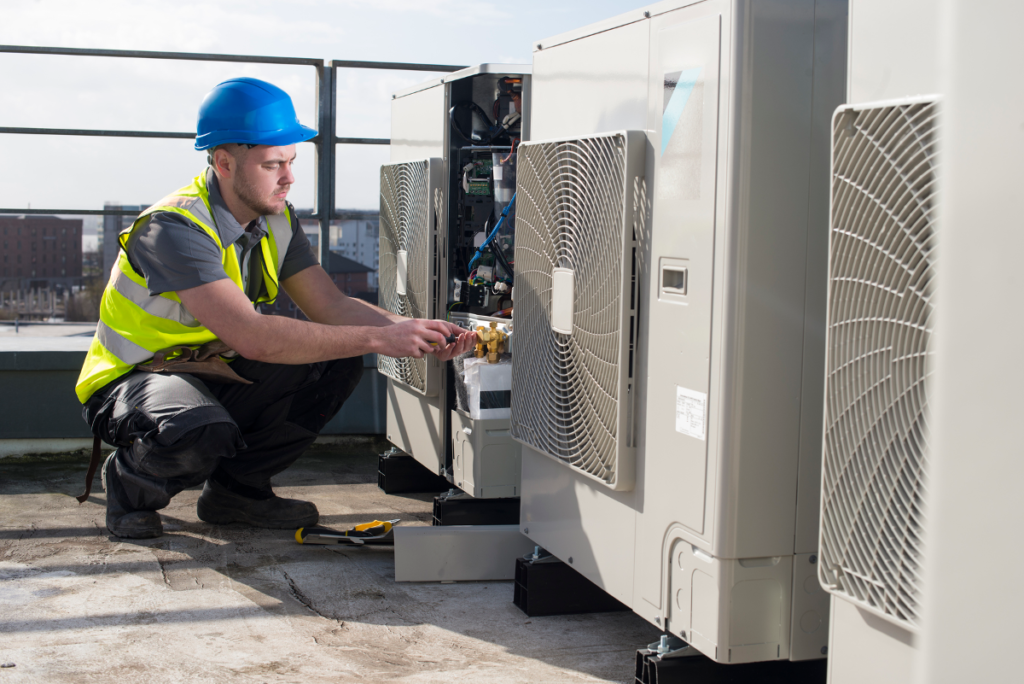
This image is property of www.coynecollege.edu.
7. How to Land a High-Paying Commercial HVAC Job
7.1 Building a strong foundation through education and training
To land a high-paying commercial HVAC job, it is crucial to build a strong foundation through education and training. Attend a reputable vocational or trade school to acquire the necessary knowledge and skills. Take advantage of hands-on training opportunities and ensure that you are up-to-date with the latest industry standards and practices.
7.2 Gaining hands-on experience through apprenticeships or internships
Hands-on experience is highly valued in commercial HVAC jobs. Consider participating in apprenticeship or internship programs to gain practical experience under the guidance of experienced professionals. This hands-on experience will not only enhance your skills but also make you a more attractive candidate to potential employers.
7.3 Developing a professional network
Building a professional network is key to accessing high-paying job opportunities in the commercial HVAC industry. Attend industry events, join professional organizations, and connect with other HVAC professionals through social media platforms. Networking can lead to valuable connections, mentorship opportunities, and access to job openings that may not be advertised publicly.
7.4 Showcasing skills and accomplishments in job applications and interviews
When applying for high-paying commercial HVAC jobs, it is important to showcase your skills and accomplishments effectively. Craft a well-written resume that highlights relevant experience, certifications, and achievements. During interviews, emphasize your technical expertise, problem-solving abilities, and customer service skills. Providing examples of successful projects or challenging situations you have handled can further demonstrate your capabilities and increase your chances of landing a high-paying job.
8. Career Development and Advancement
8.1 Opportunities for specialization and advanced certifications
As mentioned earlier, specializing in niche areas and obtaining advanced certifications can open doors to career development and advancement in the commercial HVAC field. By focusing on areas such as energy management, smart building technologies, or sustainable design, you can position yourself as an expert in a specialized field, increasing your value and earning potential.
8.2 Supervisor and management roles
Supervisor and management roles offer opportunities for career advancement in commercial HVAC. Building on your technical expertise, developing leadership skills, and gaining experience in overseeing projects and teams can lead to promotions into these higher-level positions. Supervisor and management roles often come with increased responsibilities and compensation.
8.3 Entrepreneurship and starting your own HVAC business
For entrepreneurial individuals, starting your own HVAC business can be a rewarding career path. By leveraging your technical knowledge and business acumen, you can establish your own client base, set your rates, and determine your level of success. Starting your own business allows for greater control over your career and income potential.
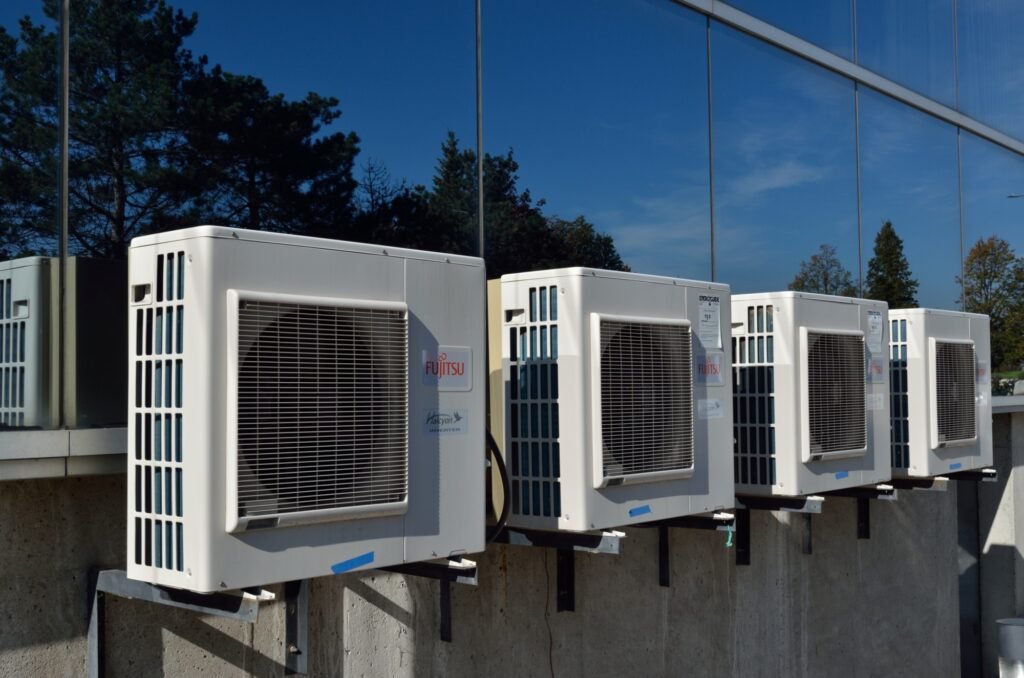
This image is property of intercoast.edu.
9. Work-Life Balance and Job Satisfaction
9.1 Flexible work schedules
Commercial HVAC jobs often offer flexible work schedules, allowing for a better work-life balance. While some projects may require being on-call or working evenings or weekends, many HVAC professionals enjoy the flexibility to plan their schedules according to their personal needs and priorities. This flexibility contributes to a better quality of life and job satisfaction.
9.2 Job satisfaction in a hands-on and problem-solving profession
For individuals who enjoy hands-on work and problem-solving, commercial HVAC jobs offer significant job satisfaction. The ability to identify and resolve complex issues, see the tangible results of your work, and provide essential services to businesses and occupants can be highly rewarding. The sense of accomplishment in ensuring the comfort and safety of commercial spaces contributes to job satisfaction.
9.3 Health and safety considerations
Health and safety considerations are important in commercial HVAC jobs. HVAC professionals must adhere to safety protocols, wear appropriate personal protective equipment, and be aware of potential hazards. Adhering to safety guidelines ensures the well-being of both themselves and the building occupants. It is important to prioritize health and safety in this physically demanding profession.
10. Conclusion
With the increasing importance of commercial HVAC systems and the growing demand for skilled professionals in the field, pursuing a career in commercial HVAC can be a lucrative and fulfilling choice. The industry offers various high-paying job opportunities, with potential for career advancement and growth. By acquiring the necessary skills, certifications, and experience, and continuously improving knowledge through continuing education, you can position yourself for success in the commercial HVAC industry. Embrace the challenges, nurture your passion for problem-solving and helping others, and enjoy the rewarding career that commercial HVAC can offer.
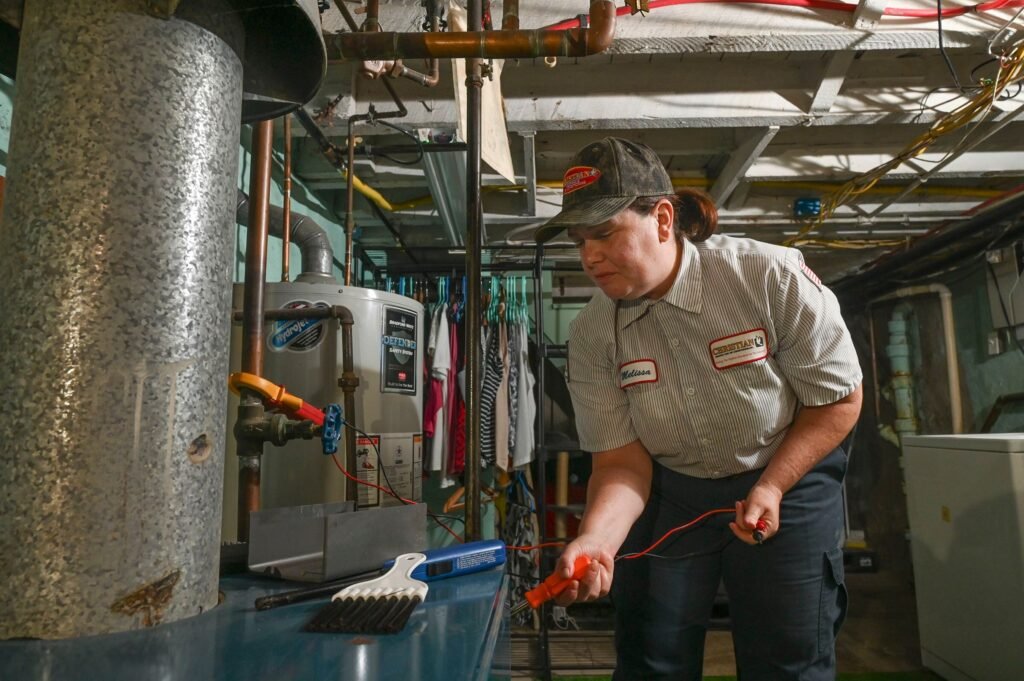
This image is property of www.inquirer.com.

